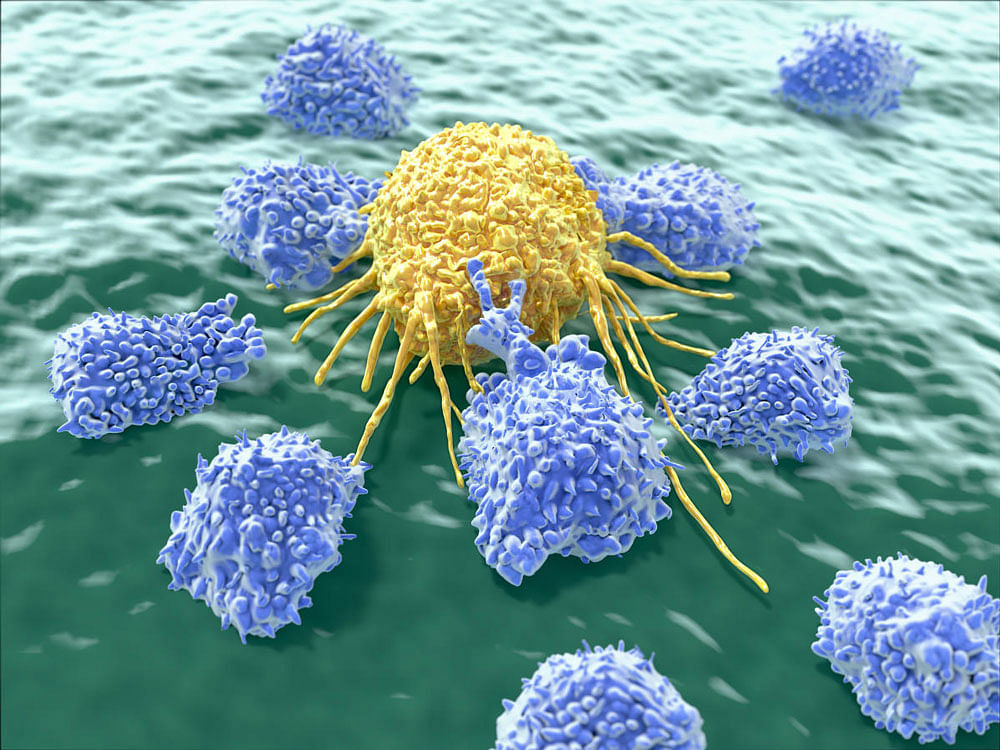City-based scientists, along with their counterparts in China, have come up with a wonder drug to treat all types of cancer.
Former vice chancellor of two universities and chief scientific advisor to Hong Kong-based Sinotar Pharmaceutical (Schenzen) K S Rangappa said, the molecule N-cyclopentyl-3-((4-(2,3-dichlorophenyl) piperazin-1-yl) (2-hydroxyphenyl)methyl) benzamide (NPB) would herald a new beginning in treating the people suffering due to cancer.
It has to be recalled that retired Chemistry professor Rangappa served as VC of Karnataka State Open University and also the University of Mysore. He said, surgery, chemotherapy, radiotherapy and immunotherapy are the major treatments now available for cancer. “Besides, there are numerous types of treatment, depending on the kind of cancer. However, they have a lot of side-effects. Even then, the rate of survival is not encouraging. NPB is a drug-based treatment and can be adopted in chemotherapy. The NPB targets and attacks only affected cells in the human body and will affect healthy cells,” he said.
Rangappa said, “As part of our recent ligand-based drug discovery programme, we designed and identified a new anti-cancer drug-like molecule that specifically targets bcl2 family member gene called Bcl-2 agonist of cell death (BAD), which mainly exists as higher amount in cancer cells and forms a heterodimer with anti-apoptotic gene to stop the cancer ‘cell-death’, where most of the cancer cells escape this process and become immortal”.
The scientists from the University of Mysore C D Mohan, R Shobith and Basappa were led by Rangappa and Peter E Lobie of Tsinghua University in China.
“We unravelled the anti-cancer effects of BAD targetting molecule, which is considered to be a landmark discovery in the development of anti-cancer drugs, as there are no direct inhibitors for BAD gene that acts by a novel mechanism of action in cancer cells. This work is published in the recent issue of ‘Proceedings of the National Academy of Sciences’, an American journal,” he said.
“Cancer is a multi-factorial disease, characterised by uncontrolled division of specific type of cells. It can affect most of the major organs in the body. The treatment options at present are associated with an array of disadvantages. Most of the chemotherapeutics have adverse effects. Surgery and radiation therapies are ineffective against metastatic cancers.
Immunotherapy is cost-ineffective. BAD is a protein essential for driving the cancer cells towards death. Cancer cells oppose their death by expressing increased concentration of proteins called Bcl-2.
In general, the inactivation of Bcl-2 or anti-apoptotic genes results in the induction of cancer cell-death. Understanding the limitations of existing therapeutic strategies, we initially designed the novel molecule targeting BAD gene, using cheminformatics platform that fitted with high-end computers and identified NPB as a lead structure, which can act as an anti-cancer agent against a wide range of cancers,” Rangappa explained.
“NPB was found to decrease the viability of human and mouse breast, endometrial, prostate, ovary, liver, colon and pancreatic cancer cells at submicromolar range. The anticancer activity of NPB was proved by many advanced methods of anti-cancer pharmacology.
When we treat cancer cells with our newly discovered NPB, it inhibits the activity of anti-apoptotic genes by interacting with it. Our drug candidate did not affect the normal cells. Evident to anti-cancer cell culture studies, NPB decreased the size of mammary tumour that was implanted, without affecting the major organs in the experimental animals. The scientists from both the countries have patented this discovery in the UK territory and PCT is claimed,” he said.
